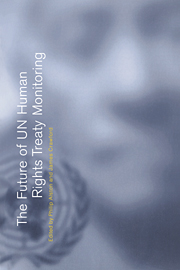Book contents
- Frontmatter
- Contents
- List of Tables, Figure, Appendices
- Notes on Contributors
- Editors' Preface
- Table of Treaties
- Table of Cases
- List of Abbreviations
- 1 The UN human rights treaty system: A system in crisis?
- A The UN human rights monitoring system in action
- B National influences and responses
- C Regional and sectoral comparisons
- D Common challenges for the treaty bodies
- E Looking to the future
- 23 Beyond ‘them’ and ‘us’: Putting treaty body reform into perspective
- Index
23 - Beyond ‘them’ and ‘us’: Putting treaty body reform into perspective
Published online by Cambridge University Press: 23 December 2009
- Frontmatter
- Contents
- List of Tables, Figure, Appendices
- Notes on Contributors
- Editors' Preface
- Table of Treaties
- Table of Cases
- List of Abbreviations
- 1 The UN human rights treaty system: A system in crisis?
- A The UN human rights monitoring system in action
- B National influences and responses
- C Regional and sectoral comparisons
- D Common challenges for the treaty bodies
- E Looking to the future
- 23 Beyond ‘them’ and ‘us’: Putting treaty body reform into perspective
- Index
Summary
The contributors to this volume have adopted approaches which are essentially empirical and critical. They are empirical in that most of the authors have been actively involved in the work of the treaty bodies, either as members of the treaty bodies, non-governmental organisation (NGO) participants, Secretariat members, or close observers. While there is a great deal of work that needs to be done from both theoretical and conceptual perspectives to explain the reasons for the successes and failures of the system, this is not the task the contributors to this volume have set themselves. Their approaches are critical in the sense that the main focus is on the demonstrated shortcomings and failures of the monitoring activities of the expert, independent committees established to monitor government compliance with obligations voluntarily accepted under each of the six principal UN human rights treaties.
Considering alternative approaches
The volume as a whole covers the gamut of problems and challenges, ranging from such petty but demoralising restrictions as the removal of pencil and paper from the meeting rooms in Geneva (in the wake of the financial crisis precipitated by the United States withholding of its assessed dues to the UN), through artificial Secretariat-enforced delays in making language translations of documents available, to much larger issues which rightly preoccupy most of the contributors.
- Type
- Chapter
- Information
- The Future of UN Human Rights Treaty Monitoring , pp. 501 - 526Publisher: Cambridge University PressPrint publication year: 2000
- 5
- Cited by



